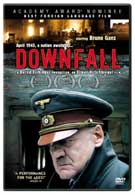Most movies that use World War II as a setting focus on the horror of war or the mistreatment of certain races and creeds. The protagonists of these films are almost always on the side of “good”, fighting against the Nazi powers. It’s very rare to find a movie that focuses instead on the opposite side, because there are few moviegoers out there who would want to rally for the Nazis. Downfall manages to tell the tale of the last few weeks of the Third Reich, without being overly-sympathetic with those most of the world would consider to be one of the greatest evils to have appeared on Earth. Let’s get this out of the way: there will be no wisecracks or jokes about a German movie about the Nazis. There will be no questioning who allowed any German to put on a Nazi uniform, or comments about a need to remind the country that the last time they wore those clothes the world as a whole ended up paying dearly. German filmmaker Oliver Hirschbiegel takes his subject and his film seriously, and so will we.
Downfall covers the mood and events over the last few weeks of the Nazis hold on Berlin. We are introduced to Berlin as it explodes from Russian gunfire marking the arrival of Allied forces. From that point on things look down for the Nazi powers. Hitler’s military is in the process of being conquered, something his advisors have kept from him. With his generals beginning to betray him, Hitler takes those he trusts most and holes up in a bunker. It’s clear to all involved that everyone will die in the bunker, which seems to be exactly why most of them are there, unwilling to live in a world without Hitler or National Socialism. While Hitler jokes that it will be easier to rebuild Germany after it has been destroyed (as opposed to destroying it himself) he hands out advice on the proper way to commit suicide, whether by poison or firearms.
Bruno Ganz’s Adolf Hitler is a performance full of subtleties and dedication. It couldn’t be easy to take on a role like this. This is not a parody or a spoof of the leader. It’s a dead-on portrayal of Hitler, from his madman rantings as he screams at his military leaders as the Führer to his calm, patient, and even gentle dealings with the women around him as a mere man. It’s impressive the movie makers were willing to present such a historically vile character with such duality, and while the movie doesn’t ask the viewers to feel anything specific towards Hitler, it does do its best to present a well rounded portrayal of the man. However, Downfall is not a tale of Adolf Hitler. While he does factor prominently into the film as the glue that holds most of these characters together, in a very Hamlet type move, the film continues for a good half hour after his death. The downfall of Nazi Germany was not solely on one man. There were many others in high ranking positions who survived after Hitler.
Instead the movie is about Traudle Junge (Alexandra Maria Lara), a woman who described herself as “not an enthusiastic Nazi” who was chosen by Hitler to become one of his secretaries. Through her more naive eyes we see some of the horrors of the Nazis - the orders given by Hitler, and testaments left by him and other high ranking officers. We see both the good and bad sides of Hitler, and begin to understand why so many loyal to Hitler chose treason over death.
The one area Downfall plays it the most safe is by keeping from creating a sympathetic feeling toward Hitler or the other Nazis in the bunker, with the possible exception of Traudle Junge. Unfortunately by playing it safe and not making us sympathetic to their plight, we also feel no remorse or concern for their imprisonment. These are the leaders of one of the most devastating forces to human life on the planet. If they choose death over surrender, who am I to complain as a viewer. Of course, never sympathizing with the characters means as a viewer we’re subjected to a long story of people we never really care for, which means the movie never connects with us and as a result it just feels really long. My major complaints about Downfall as a DVD are going to sound rather ignorant as a film fan. One of the thing that bothers me most about the moviegoing public are people who automatically rule out foreign films because they don’t want to have to read a movie, preferring films with English dialog and missing some great films because of their inability to open their minds that foreign films can be exceptional despite, or sometimes because of, subtitles. However, subtitles, and having to read through bonus material is my major complaint about this DVD release. Isn’t hypocrisy grand?
See, when you watch a foreign film there are more elements than just the fact that it’s in a different language. There is the cinematography, the lighting, the subtleties you find from other cultures, and of course, the tone and inflection in the dialog being delivered. Just because it’s in a different language doesn’t mean it’s not something that can be understood. By hearing the way the words are delivered, I know what meaning to give to the subtitles I’m reading. Unfortunately, with behind-the-scenes documentaries, there are considerably less elements to take into consideration. Whether you’re listening to Martin Scorcese, or M. Night Shyamalan talk about their film, the tone is pretty much the same, so listening to a director, producer, or writer talk about their work in a different language and having to read subtitles is considerably less interesting then watching a foreign film.
However that’s how the making of Downfall featurette is presented. Directors and producers, actors and writers all talk about their work on the film, distinguishable only by their different voices. As they talk rough footage is shown on screen from behind the scenes of the movie, but since your focus has to be the subtitles, and the rough footage doesn’t direct your attention anywhere in particular, you end up missing something. Either lost in the images you cease reading the subtitles, or focusing on the subtitles you might as well be reading a book on the making of the movie as you miss the images. What’s worse is several of the speakers, particularly historians, present their information in English, which is dubbed over by a German translator which is then presented in subtitles. It makes you wonder how different the movie is in its native language as compared to the subtitles, since the audible parts of the English interviews are definitely different from the subtitles of the German translation we receive. Obviously the documentary was made for the film’s native country and then just subbed for the conversion to English. It's a shame the presentation is so distracting, because the movie has so many good technical and historical aspects, I'm sure a well done documentary would have been very interesting.
Your Daily Blend of Entertainment News
Also included are interviews with several of the cast and crew. While these are also subtitled, it’s less annoying since you’re watching strictly an interview with one person. A lot of the information the cast volunteers is redundant with information they gave in the documentary, particularly by Bruno Ganz, so I highly recommend watching the interviews before the documentary.
After the subtitled interviews and documentary I entered into the Director’s Commentary with a bit of hesitancy. After all, how would the movie present a subtitled commentary on top of a subtitled movie? Thankfully I didn’t have to find out. Hirschbiegel speaks English through his director’s commentary, making it the most valuable of the discs bonus material. Hirschbiegel offers some fantastic information through his commentary, including why he felt the need as a filmmaker and as a German to present the most accurate film as possible, and the troubles this caused for him. It never really occurred to me that the characters of the movie are not only historical, but well-documented historical characters. Through the Nuremberg Trials and personal experiences, there is a lot of information available on how these people looked and acted. I’m sure trying to stay true to that was quite a challenge.
Historical fans of the World War II era will probably find Downfall valuable as one of those rare movies that presents an opposite side of the war on film. Many others unfortunately will not find that value in the movie, and while it is an interesting film, it is also a long movie to sit through without much of an emotional connection to the characters. The DVD release does little to build upon that, although it does stress the rigors the cast and crew went through to create as realistic a film as possible.

